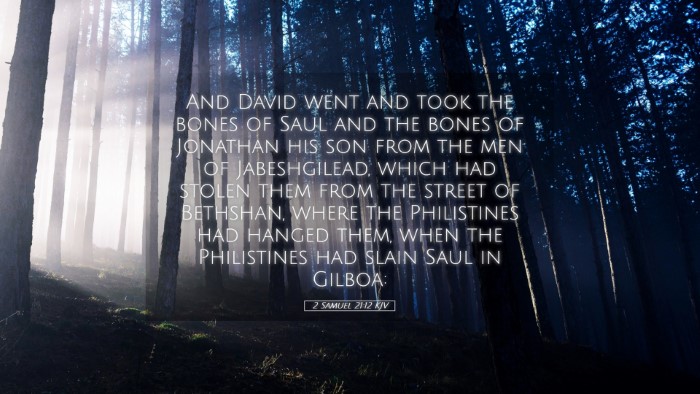Commentary on 2 Samuel 21:12
Verse: "And David went and took the bones of Saul and the bones of Jonathan his son from the men of Jabesh-gilead, which had stolen them from the street of Beth-shan, where the Philistines had hanged them, after the Philistines had slain Saul in Gilboa."
Introduction
This verse occurs in the context of King David’s reign over Israel and highlights significant themes such as honor, respect for the dead, national identity, and the fulfillment of faithful leadership. The historical background involves the tragic fate of Saul and Jonathan as well as the actions of the men of Jabesh-Gilead, demonstrating the unfolding of God's providence in history.
Contextual Overview
David's retrieval of Saul and Jonathan’s bones serves multiple purposes. It reflects a deep respect for his predecessor and a celebration of proper burial rites, which were of utmost importance in ancient Near Eastern culture. The Philistines' dehumanizing treatment of Saul's body by hanging it on the wall of Beth-shan constituted an act of humiliation, which David sought to rectify.
The Men of Jabesh-Gilead
The actions of the men of Jabesh-Gilead are commendable. They risked their lives to retrieve the remains of Saul and his son a significant act of loyalty to their former king and a symbol of their continued allegiance to a united Israel.
Henry notes that this act was not just a personal loyalty to Saul but a nationalistic gesture, reflecting a desire for unity among the Israelites despite the fractures present in Saul’s reign.
Theological Insights
- Honor Among Kings: David’s retrieval of the bones highlights the biblical theme of honoring one’s leaders. As noted by Clarke, the honor given to Saul by David in this act signifies the acknowledgment of God’s anointing, despite Saul’s failures.
- The Importance of Burial Rites: According to Barnes, the significance of a proper burial in the Jewish tradition underlines the view of the body as sacred. David’s actions affirm this belief and protect the dignity of Saul and Jonathan, aligning with God’s covenant people’s understanding of life and death.
- National Identity and Unity: The retrieval symbolizes a step towards healing and unification among the tribes of Israel after Saul’s contentious reign. David, by honoring Saul, sets a precedent for reconciliation and the establishment of a kingdom based on shared history rather than division.
David’s Leadership
In examining David's character through this event, we see a leader who prioritizes moral integrity and fidelity. Matthew Henry highlights that true leadership involves acknowledging past leaders and recognizing the pain associated with transitions of power. David’s leadership style emphasizes compassion and respect—a mode for future governance.
By ensuring a dignified burial, David positions himself as a king who understands the weight of history, both for his people and for the legacy he would establish. This act of retrieving the bones was not merely a personal undertaking; it was a powerful statement of David's vision for Israel.
Implications for Modern Readers
This passage speaks profoundly to pastors, students, and theologians today. It challenges contemporary leaders to consider how they treat those who have come before them and how they honor legacy within their communities of faith. Just as David retrieved the bones of those who had been dishonored, modern leaders are called to honor those within their lineage, thus fostering community and collective identity.
Conclusion
In conclusion, 2 Samuel 21:12 encapsulates themes of honor, respect for the dead, and the vital importance of national and spiritual unity. David’s actions provide rich fodder for reflection on leadership, the significance of history, and the sacredness of life and death. This passage, rooted in its historical narrative, encourages a faithful response to legacy and honors God’s providence through Israel's tumultuous history.


